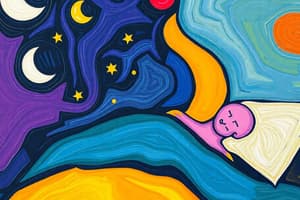Podcast
Questions and Answers
What is a potential pharmacologic intervention for insomnia?
What is a potential pharmacologic intervention for insomnia?
- Watching stimulating shows before bed
- Nighttime exercise routines
- Increased caffeine intake
- Use of sleep medications (correct)
What associated factor is important to consider when addressing insomnia?
What associated factor is important to consider when addressing insomnia?
- The number of hours slept
- The quality of the mattress
- Environmental noise levels
- Bedtime routines (correct)
Which of the following factors may exacerbate insomnia?
Which of the following factors may exacerbate insomnia?
- Irregular eating habits before bed (correct)
- Use of sleep inducers
- Calming bedtime environment
- Regular sleep schedule
Focusing solely on the number of sleep hours can lead to which misconception about insomnia?
Focusing solely on the number of sleep hours can lead to which misconception about insomnia?
Which option best describes the goal of pharmacologic intervention in treating insomnia?
Which option best describes the goal of pharmacologic intervention in treating insomnia?
What characterizes primary insomnia?
What characterizes primary insomnia?
Which role does growth hormone play in the body?
Which role does growth hormone play in the body?
How does primary insomnia differ from comorbid insomnia?
How does primary insomnia differ from comorbid insomnia?
Which of the following statements is true regarding sleep disorders?
Which of the following statements is true regarding sleep disorders?
Which factor is NOT associated with primary insomnia?
Which factor is NOT associated with primary insomnia?
Flashcards
Primary Insomnia
Primary Insomnia
A sleep disorder where the difficulty sleeping is not a symptom of another medical or psychological issue.
Comorbid Insomnia
Comorbid Insomnia
When two or more conditions happen together, like insomnia and another health problem.
Growth Hormone
Growth Hormone
A hormone produced by the body that helps in tissue growth, development, and repair.
Pharmacologic Intervention
Pharmacologic Intervention
Signup and view all the flashcards
Associated Factors
Associated Factors
Signup and view all the flashcards
Focusing Solely on Sleep Hours
Focusing Solely on Sleep Hours
Signup and view all the flashcards
Insomnia Manifestations
Insomnia Manifestations
Signup and view all the flashcards
Insomnia Triggers
Insomnia Triggers
Signup and view all the flashcards
Study Notes
Sleep Stages
- Sleep is divided into stages, both REM (Rapid Eye Movement) and NREM (Non-REM).
- NREM sleep has three stages (1, 2, and 3/4):
- Stage 1: Short stage, characterized by a slowing of EEG frequency and light sleep. Easily awakened.
- Stage 2: Slightly deeper sleep than stage 1. EEG activity slows further, and lasts approximately 20 minutes. About 50% of adult sleep is stage 2.
- Stage 3/4: Deepest sleep. Characterized by large slow waves on the EEG, where it takes approximately 15 seconds for an individual to wake up. Sleepwalking, sleeptalking, and night terrors often occur in this stage. About 90 minutes after starting NREM.
- REM sleep: Irregular heart and respiratory rates, rapid eye movement. 80% of dreaming happens in REM sleep. Adults typically have 4-6 REM cycles in a night. Accounts for 20%-25% of sleep in adults.
Sleep-Wake Cycle
- Maintaining a consistent sleep-wake rhythm is crucial, more significant than solely focusing on the number of sleep hours; it impacts biological and emotional well-being.
- Sleep pattern disruptions can stem from various factors:
- Comfort level
- Emotional stress
- Environmental factors
- Lifestyle factors
- Diet
- Drugs/substances
- Age
- Illness/hospitalization
Sleep Disturbance Problems
- Sleep disturbances can lead to reduced work productivity, increased accident risk, short-term memory problems, and impaired cognitive and motor performance.
Studying That Suits You
Use AI to generate personalized quizzes and flashcards to suit your learning preferences.
Related Documents
Description
Explore the various stages of sleep, including REM and NREM, and understand their characteristics. This quiz covers the functions of each sleep stage, highlighting their significance in maintaining a healthy sleep-wake cycle. Test your knowledge on how these stages impact overall well-being.




